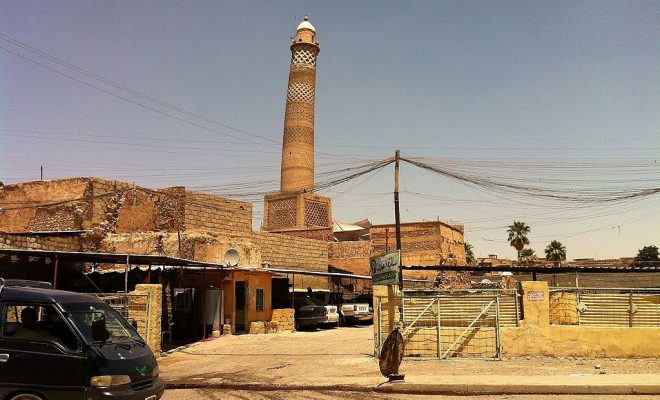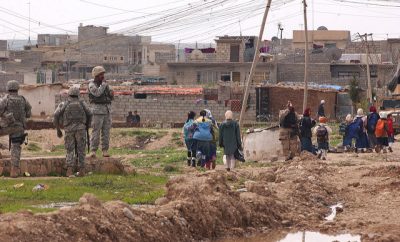 Image courtesy of Faisal Jeber; License: (CC BY-SA 4.0)
Image courtesy of Faisal Jeber; License: (CC BY-SA 4.0)
World
Should We View the Destruction of the al-Nuri Mosque as a War Crime?
As Muslim communities celebrated Eid al Fitr last weekend, mosques across the globe welcomed worshippers for the celebration–except at Iraq’s Great Mosque of al-Nuri, a thousand-year-old structure recently reduced to rubble in the battle for Mosul.
Islamic State’s Amaq news agency has claimed the mosque was destroyed by a U.S. airstrike, but both U.S. forces and the Iraqi army have stated that ISIS militants destroyed the mosque as they retreated from Mosul. Video evidence shows the blast that toppled the building exploding from within multiple levels of the minaret rather than from the impact of an airstrike.
The al-Nuri Mosque has joined the long list of monuments and historic sites destroyed in the Middle East over the past twenty years. Many cultural heritage sites in the Middle East have been systematically erased, from the Buddha statues of Bamiyan destroyed by the Taliban in Afghanistan to the dozens of temples and historic cities that have been decimated by ISIS over the past three years. The justification for this destruction is often that the ancient sites celebrate idolatry or polytheism but sometimes, as in the case of the al-Nuri Mosque, the intentional destruction of the site is not motivated by a higher cause–a site that represent generations of tradition and history is simply seen as expendable. Iraq’s Prime Minister Haider al-Abadi has claimed that blowing up the al-Nuri Mosque was a declaration of defeat and a clear sign that ISIS is losing the battle for control of the city–but the destruction of the mosque is still a heavy blow to Mosul, as Iraqi military leaders had privately hoped to liberate the mosque and celebrate Eid al Fitr within its hallowed halls.
The leveling of historic sites is often written off as “collateral damage” but an important International Criminal Court case in 2016 could change that. An Islamic militant who destroyed the shrines of Timbuktu was sentenced to nine years in prison after the ICC labeled cultural destruction a war crime. ISIS militants who are captured would of course be put on trial for far more violent and severe crimes than cultural destruction but consider that the International Committee of the Red Cross’ definition of war crimes does include “making buildings dedicated to religion, education, art, science or charitable purposes or historic monuments the object of attack, provided they are not military objectives.”
The destruction of the al-Nuri Mosque and sites like it do impact the cultural legacy of a nation and should be treated as serious crimes. During the bombings of World War II, cultural sites were burnt to the ground every night but we are now in a different era of warfare and should set different standards. Mosul’s air, water, and land have been polluted and torn apart by the battle for the city but Iraqi forces will seek to rebuild once they have expelled ISIS forces. A structure like a large mosque is important for the rebuilding process on a logistical level as it would serve as an ideal place to set up shelters, food and clothing distribution and a headquarters for relief efforts–but we must also think beyond the practical. The al-Nuri Mosque was a symbol of a shared identity and heritage that defined Mosul–and the militants who destroyed it are committing a form of cultural genocide.








Comments